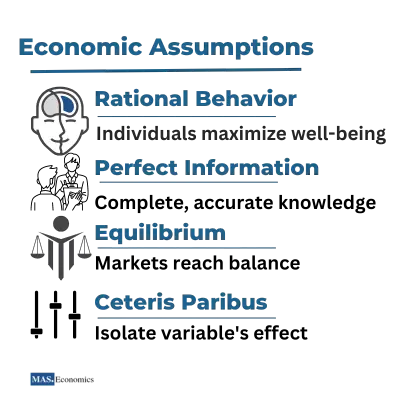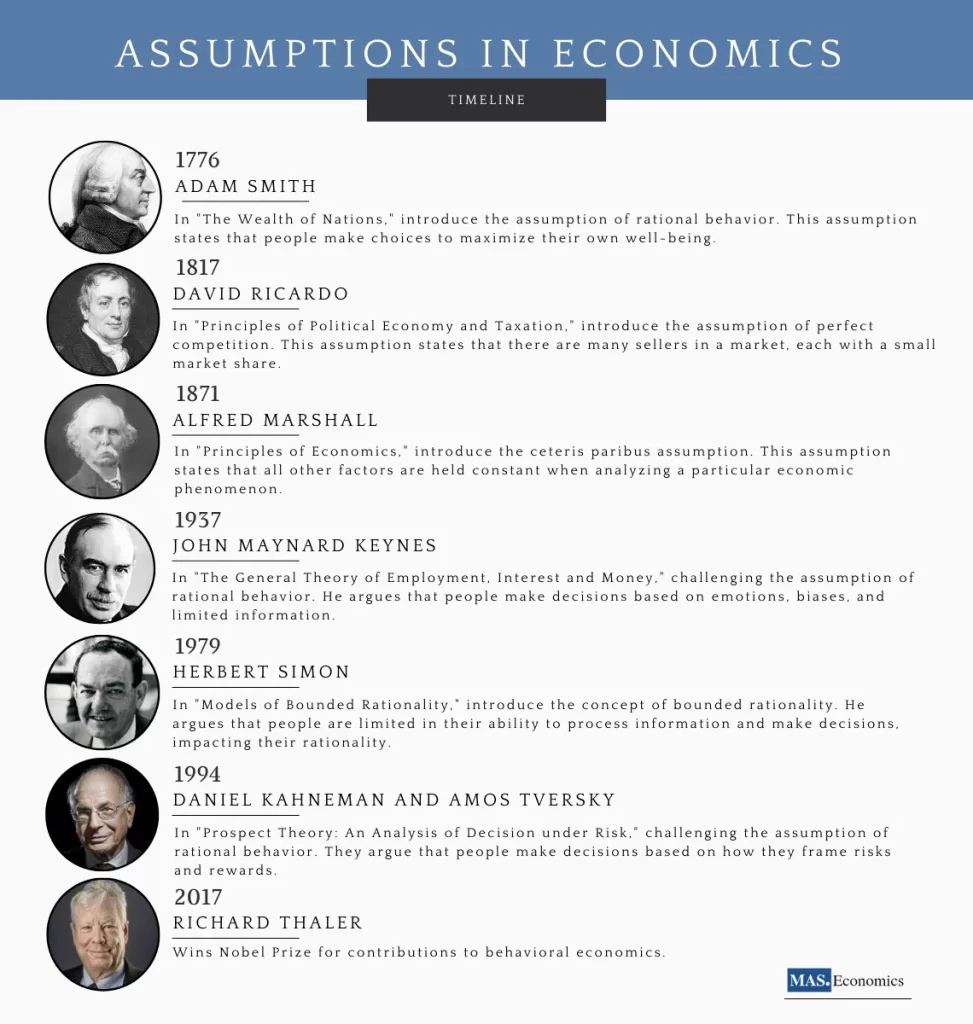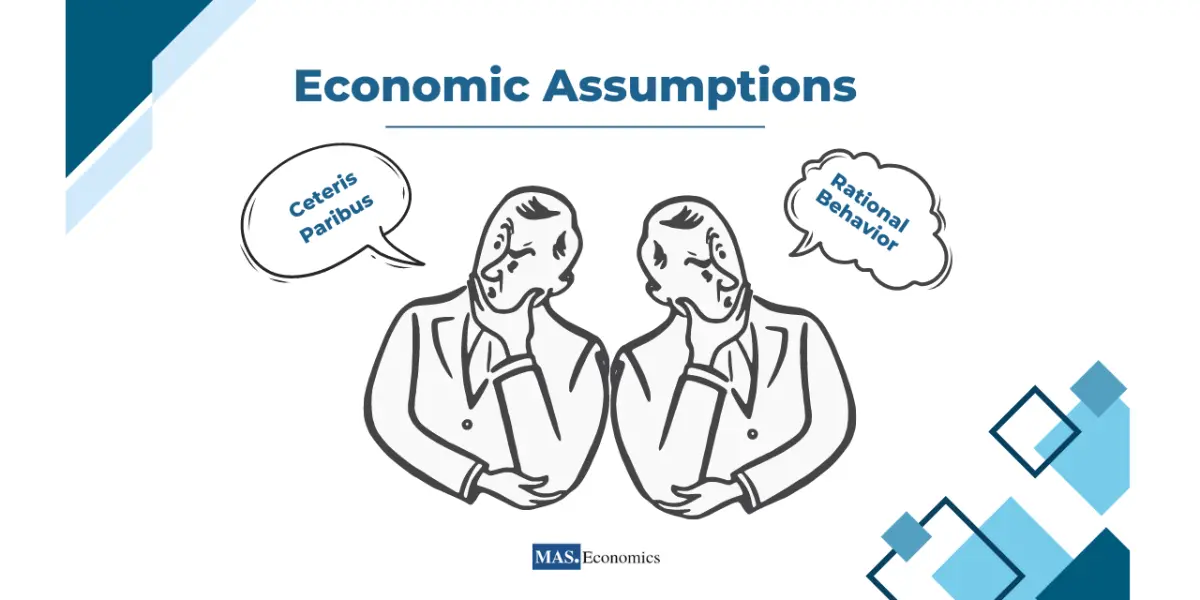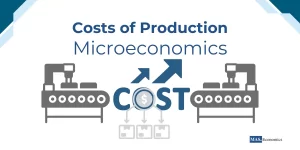Welcome to MASEconomics, your guide to the world of economics. In this blog post, we will explore the role of assumptions in economics. We will discuss the different types of assumptions, their historical context, and how they have shaped economic thought.
What Are Assumptions?
Assumptions in economics are simplified statements about the functioning of the world made to streamline complex economic models. They enable economists to isolate critical factors, making models more manageable and interpretable. While these assumptions may not perfectly mirror reality, they provide a structured framework for analysis.
Significance of Assumptions
Economic assumptions are essential to the discipline. They allow economists to simplify reality and make it easier to analyze. By isolating critical factors, assumptions make models more manageable and interpretable. While these assumptions may not perfectly mirror reality, they provide a structured framework for analysis.
Assumptions also help economists to focus on the most pertinent aspects of a problem, enhancing the clarity and precision of analysis. By making simplifying assumptions, economists can create models that are more tractable and easier to solve. This can lead to better insights into the workings of the economy.
However, it is important to remember that assumptions are not always accurate representations of fact. As our understanding of human behavior evolves, so should our economic assumptions.
Types of Assumptions
There are many types of assumptions in economics:

- Rational behavior: This assumption states that individuals make decisions that are in their best interests, given their knowledge and constraints. This assumption is often used in economic models to simplify the analysis of human behavior. However, it is important to note that people do not always behave rationally, and there are many factors that can influence their decisions.
- Perfect information: This assumption states that individuals have all the information they need to make the best decision. This assumption is also often used in economic models to simplify the analysis. However, in reality, people often do not have perfect information, and this can affect their decisions.
- Equilibrium: This assumption states that markets will eventually reach a state where supply and demand are equal. This assumption is used in economic models to predict how markets will behave. However, it is important to note that markets do not always reach equilibrium, and there are many factors that can disrupt the equilibrium.
- Ceteris paribus: This Latin phrase means “all else equal.” This assumption is used in economic models to isolate the effect of one variable on another. By assuming that all other variables are held constant, economists can focus on the relationship between the two variables of interest. However, it is important to note that this assumption is not always realistic, and changes in other variables can also affect the relationship between the two variables of interest.
The Use of Assumptions in Economics
The use of assumptions in economics is a controversial topic. Some economists argue that assumptions are necessary to make economic models tractable, while others say they can lead to unrealistic or misleading results. Ultimately, the decision of whether or not to use assumptions is a matter of judgment.
Those who support the use of assumptions argue that they allow economists to simplify reality and make it easier to analyze. They also argue that assumptions can help economists to focus on the most important factors and to identify the relationships between different variables.
Those who oppose the use of assumptions argue that they can lead to unrealistic or misleading results. They also argue that assumptions can be used to justify any conclusion, regardless of whether it is supported by evidence.
Assumptions in the Historical Context
Economic assumptions have evolved over time, reflecting the development of the discipline and the changing understanding of human behavior.
In the early days of economics, economists made many assumptions that are now considered unrealistic. For example, they assumed that individuals always behave rationally and that markets always reach equilibrium. However, as economists gained a better understanding of human behavior, they began to make more realistic assumptions.

18th Century: Rational Behavior by Adam Smith
Adam Smith laid the foundations of economic assumptions in his groundbreaking work The Wealth of Nations (1776). Smith introduced the assumption of rational behavior, suggesting that individuals make choices that maximize their well-being. This concept underpins modern economic analysis.
19th Century: Perfect Competition by David Ricardo
David Ricardo’s Principles of Political Economy and Taxation (1817) introduced the assumption of perfect competition. This assumption asserts the presence of many sellers in a market, each holding a small market share. It simplifies the study of market dynamics but has since been challenged by insights from industrial organizations.
20th Century: Ceteris Paribus by Alfred Marshall
Alfred Marshall’s Principles of Economics (1890) popularized the “ceteris paribus” assumption. This Latin phrase means “all else equal” and signifies that other variables remain constant when analyzing a particular economic phenomenon. While this assumption aids tractability, it can sometimes lead to unrealistic outcomes.
Modern Challenges
Bounded Rationality and Behavioral Economics
In the late 20th century, behavioral economics emerged as a challenge to traditional economic assumptions. Behavioral economists argue that people do not always behave rationally and that emotions, biases, and heuristics often influence their decisions. This has led to a new generation of economic models that are more realistic and can better explain human behavior.
One of the most important contributions of behavioral economics is the concept of bounded rationality. Bounded rationality states that individuals have limited cognitive abilities, which means that they cannot always make the best decision given all the available information. This means that people often make decisions that are not in their best interests, even if they are trying to behave rationally.
Another important contribution of behavioral economics is the study of heuristics. Heuristics are mental shortcuts that people use to make decisions. Heuristics can be helpful in some cases, but they can also lead to biases and errors.
The findings of behavioral economics have challenged many of the traditional assumptions of economics. This has led to a rethinking of how economists model human behavior and how they use economic theory to make predictions.
Today, economists still make assumptions, but they are more aware of the limitations of these assumptions. They also try to use assumptions that are consistent with the available evidence.
Conclusion
Economic assumptions are an essential part of the discipline. They allow economists to simplify reality and make it easier to analyze. However, it is important to remember that assumptions are not always accurate representations of fact. As our understanding of human behavior evolves, so should our economic assumptions.
Thanks for reading! If you enjoyed this series, spread the knowledge by sharing it with friends and on social media.
Happy learning with MASEconomics!




